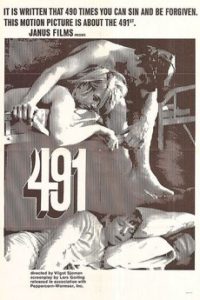 It’s always interesting viewing a once-shocking film decades after the fact. 491, a Swedish drama released in 1964, is a perfect example of such, a film that was so controversial in its day it was credited with inspiring the formation of a conservative political organization, the Christian Democratic Party, in its native land, and seized by United States customs agents in the mid-1960s. Even Swedish dog lovers were said to have been outraged by a climactic scene involving a German shepherd forced to perform degrading acts. Now, of course, 491 is about as shocking as an episode of GOSSIP GIRL, and not nearly as titillating.
It’s always interesting viewing a once-shocking film decades after the fact. 491, a Swedish drama released in 1964, is a perfect example of such, a film that was so controversial in its day it was credited with inspiring the formation of a conservative political organization, the Christian Democratic Party, in its native land, and seized by United States customs agents in the mid-1960s. Even Swedish dog lovers were said to have been outraged by a climactic scene involving a German shepherd forced to perform degrading acts. Now, of course, 491 is about as shocking as an episode of GOSSIP GIRL, and not nearly as titillating.
The film, directed by the talented Vilgot Sjöman, was based on a 1962 novel by Lars Görling (published in English in 1966 by Grove Press) whose main selling point was its shock value. Among the novel’s admirers was Görling’s fellow countryman Ingmar Bergman, who was apparently instrumental in putting together this film adaptation. Görling, a flamboyant figure whose adolescence was apparently not dissimilar to what we’re shown in 491, committed suicide two years after this film was released. Sjöman, meanwhile, went on to helm the infamous I AM CURIOUS (YELLOW) in 1967 and I AM CURIOUS (BLUE) the following year, which caused a furor that far eclipsed that of 491, and like it have not dated well at all.
491’s subversive leanings are evident in its title, referring to seventy times seven, i.e. 490, which according to the Bible is the number of sins one can commit and still be forgiven by Jesus Christ. Apparently the climactic (offscreen) outrage in this film is equivalent to sin number 491.
Not that there aren’t plenty of other outrages committed in this account of Nisse, a wayward teenager who agrees to take part in a psychological test that involves several young men being shut up in a big city tenement and subjected to “Objectivity” treatments each morning. These guys spend their days arguing, brawling and casting judgment on passerby from the roof of the tenement. They also plot to overthrow the experiment’s creepy ringleader by proving that he’s homosexual (another previously “shocking” aspect).
Eventually the boys hatch a plan to sell alcohol for inflated prices, and during a night out on the town attempt to put that gambit into action. In the process they pick up a whore named Steva and bring her back to the tenement; she quickly gloms onto Nisse, who takes to prostituting her on city streets. Nisse also finds a dog that plays a big part in the climax, in which Steva is raped by attackers both human and otherwise.
In keeping with the novel, this film is taken up largely with profane (by early 1960s standards) dialogue; there’s much talk about sex and the liberal usage of words like “fuck” and “cunt.” There are also a number of potentially shocking acts, including illicit sex, masturbation, vomiting and bestiality, but they’re all kept discreetly off-screen (I understand the film’s original cut was far more revealing, but much of its bite was lost to Swedish censors). Clearly all this was supposed to distract us from the fact that not much ever happens, and that the overriding message—that criminal elements exist among us whose natures are resistant to social programs—is hardly profound.
A further problem is that the protagonists are all notably coiffed and clean-shaven and, most damagingly, look to be far older than the teenagers they’re supposed to be.
Yet the film isn’t poorly made. It’s strikingly gritty, with unobtrusive editing that smoothly incorporates elements familiar from the various new wave film movements extant at the time of 491’s making, such as unmotivated freeze frames, haphazard voice-over dialogue, etc. The performances aren’t even bad, although that doesn’t change the fact that, again, none of the actors look at all like the lower class slimeballs they’re meant to be portraying.
Vital Statistics
491
Svensk Filmindustri
Director: Vilgot Sjöman
Producer: Lars-Owe Carlberg
Screenplay: Lars Görling, Vilgot Sjöman
(Based on a novel by Lars Görling)
Cinematography: Gunnar Fischer
Editing: Lennart Wallen
Cast: Lars Lind, Leif Nymark, Stig Tornblom, Lars Hansson, Sven Algotsson, Torleif Cederstrand, Bo Andersson, Lena Nyman, Frank Sundstrom, Ake Gronberg, Mona Anderson, Jan Blomberg, Siegfried Wald, Willem Fricke, Erik Hell, Leif Liljeroth
